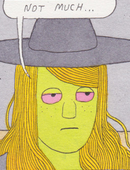|
LET’S READ THE KINGKILLER CHRONICLE CRITICALLY PART 3: “The worst had happened, and it hadn’t been that bad.” Chapter 2, “A Beautiful Day”, introduces Chronicler, the third major player in the framing story. He actually has a proper name, but the insistence on his title tells me that he was originally supposed to be more of an abstract, typified character found in fairy tales and the like. Kingkiller’s form is however too realistic to work with something like that for long, so I assume that it’s an artefact from earlier drafts. In the chapter itself, Chronicler is introduced being robbed by courteously professional bandits. Chronicler is fully compliant, as he is an experienced man of the world. He continues on his journey with most of his money intact to further establish this. It’s no great failure, but the chapter is simply tepid, and the Chronicler is left thinly characterised. Since the scene starts in the middle of the robbery, there’s no real action to exploit, but there’s also no willingness to emphasize the absurdity of the situation as someone like, say, Jack Vance would do. It’s one of those uncomfortable middle grounds that seem to be becoming a rule as I read along. But again, this is not really bad, but tepid. What it does contribute is following on the motif of ignorance versus knowledge with the opposition of the soldier-bandits and Chronicler. Chapter 3, “Wood and Word”, returns to Kote at Waystone Inn, with an extended scene of his wondrous sword being attached to an immaculate mounting frame. The sword is named “Folly,” and in principle this is characterisation yet the immediate takeaway is the sumptuousness of the objects involved. There is in fact little explanation why this was ever undertook in this scene, and the scene lurches anruptly to the next as the silence of Waystone Inn is shattered by the arrival of more guests. There’s a scene with children reciting ominous playground songs while a tinker is at work and Kote tends to the guests. We also see some inconsistency of viewpoint: quote:Kote guessed the travelers had been together a month or so, long enough to become comfortable with each other, but not long enough to be squabbling over small things. They smelled of road dust and horses. He breathed it in like perfume. Here Kote both serves as the point of view, but after one paragraph is an object of interest to an omniscient observer. One of the guests drunkenly recognises as a figure of no little renown: quote:"Kvothe the Bloodless.” The man pressed ahead with the dogged persistence of the inebriated. “You looked familiar, but I couldn’t finger it.” He smiled proudly and tapped a finger to his nose. “Then I heard you sing, and I knew it was you. I heard you in Imre once. Cried my eyes out afterward. I never heard anything like that before or since. Broke my heart.” This is where the obscene hero-worship of the protagonist begins. Kote is not merely an innkeeper with secrets, he is Kvothe, hero of legend. The purpose of every subsequent chapter is to elaborate on what makes him exceptional. I’ve elaborated on this elsewhere, and I will do so again towards the end. For now, let’s say that his character is written hollow, and Kvothe has the young man drugged to cover for himself. He also prepares to act against the scaels, the spider-like monsters introduced in the first chapter. quote:Kote shrugged. “My granda always told me that fall’s the time to root up something you don’t want coming back to trouble you.” Kote mimicked the quaver of an old man’s voice. “‘Things are too full of life in the spring months. In the summer, they’re too strong and won’t let go. Autumn…’” He looked around at the changing leaves on the trees. “‘Autumn’s the time. In autumn everything is tired and ready to die.’” Again, this seems like confusion of view-points. It’s not so much that it’s really on the nose, but it’s strange that we hear this narrated by Kvothe specifically. That would imply that we were not privy to the Kvothe's thoughts and feelings already. Umberto Eco’s Baudolino is a good comparison, where characters vocalize the ideas and themes around which the story revolves, because the narrative voice (whether Baudolino or in the framing story) cannot do it alone. In the quote Kvothe vocalizes an ominous one-liner, which granted, follows up on that old autumn motif. It also further characterises Kvothe as deceptive and ruthless, as his character is still a mystery. Something fundamentally wrong with Rothfuss’s fantasy world is also becoming evident: there is simply little done to justify The Name of the Wind being a fantasy story. Fantasy is literature of the impossible, yet The Name of the Wind is so far utterly prosaic. The otherworldly has appeared, but is robbed of any imaginative or metaphorical force. Even the poetically charged prologue establishes nothing fantastical. The country types that haunt the novel are the most banal types instead of characters. The world exists elsewhere, and a chance at an establishing moment has been lost. The counterpoint to this is that the prosaic framing story serves as a contrast to the fantastical elements, but this is undermined when the story proper begins. The question remains: what is the purpose of this fantastical world? ROTHFUSSIAN ATTRIBUTES [quote] And while it was obviously a sword, it was not a familiar shape. At least no one in this town would have found it familiar. It looked as if an alchemist had distilled a dozen swords, and when the crucible had cooled this was lying in the bottom: a sword in its pure form. It was slender and graceful. It was deadly as a sharp stone beneath swift water. [/quote BravestOfTheLamps fucked around with this message at 15:31 on Dec 9, 2016 |
|
|
|

|
| # ? May 12, 2024 01:57 |
|
Patrick Rothfuss posted:And while it was obviously a sword, it was not a familiar shape. At least no one in this town would have found it familiar. It looked as if an alchemist had distilled a dozen swords, and when the crucible had cooled this was lying in the bottom: a sword in its pure form. It was slender and graceful. It was deadly as a sharp stone beneath swift water. The thing is, there's a science to swords, and each design element that goes into a sword has its purpose. Curves, single edges versus double edges, the width of the blade, and so on. A "sword in its pure form" is just a hunk of metal with the edges sharpened a bit.
|
|
|
|
Mars4523 posted:What the gently caress does this even mean? It's just words. Well, it's Rothfuss, so he means a katana. Yes, I know, it doesn't make sense outside of weeaboo logic. But still: it's what he means.
|
|
|
|
HELLO LADIES posted:Well, it's Rothfuss, so he means a katana.
|
|
|
|
Ravenfood posted:gently caress, I missed that. I just thought he was trying to describe it as some form of sword-ideal. The essence of sword, essentially, or the object which is so inherently "sword" that all other swords are described. I never thought that the "shape" was actually a literal shape, but instead a clumsy way to describe just how "sword" the sword was. Oh, I'm sure it's probably all that, too, because he does have his pretentions. But it's also in reference to Saicere/Caesura, which is defs a katana.
|
|
|
|
Rothfic posted:Kote guessed the travelers had been together a month or so, long enough to become comfortable with each other, but not long enough to be squabbling over small things. They smelled of road dust and horses. He breathed it in like perfume. I agree with nearly everything you're criticizing, Lamps, but I'm going to play devil's advocate here. This is not necessarily switching to omniscient narration, if you're willing to make the stretch that this is what Kvothe is thinking about while doing his tavern keeper schtick. All that's happened is that the filter words (guessed, thought, saw, etc) have been removed. Now, if he wanted to definitely resolve the PoV issue, he could have changed the second sentence to read quote:Ready with a drink just as a person called for it, he talked and listened in what he judged were the right amounts. In general, the removal of filter words throughout a piece is a good practice, and is hammered home in modern MFA fiction programs (source = me, second year MFA creative writing student). But if I am going to give Rothfuss the benefit of the doubt that this is NOT an instance viewpoint inconsistency, I have call him out on his inconsistently in style. Throughout the piece, he uses filter words whenever he feels like it, and leaves them off when he thinks the sentences will "sound better". Another inconsistency is Kvothe's personality. He is a withered husk of a man with little to live for, and it is implied that he takes little joy in anything. Yet: quote:They smelled of road dust and horses. He breathed it in like perfume. A chronically depressed person does not take enjoyment in small things. These are not the thoughts of a man waiting to die. He would not stop and smell the roses. Comparing the dirty scent of the road to perfume makes me think he is reveling in the smell. This means he once loved traveling. The smell might initially be pleasant, but it would set him to thinking about the old days and everything he lost. He should be fixated on his failures, and very sensitive to triggers that might remind him. MartingaleJack fucked around with this message at 05:19 on Feb 18, 2016 |
|
|
|
Rothfuss posted:It was deadly as a sharp stone beneath swift water. I always liked this simile. Though I would have used "dangerous" or "efficient" instead of deadly.
|
|
|
|
Yeah; sharp stone beneath swift water is really evocative for me. Maybe it's just because I personally got a cut from a sharp rock in a river on one of the very few camping trips I went on as a kid
|
|
|
|
Permanently embedded in your frontal lobe is more than just a cut, my friend.
|
|
|
|
|
The Slithery D posted:Permanently embedded in your frontal lobe is more than just a cut, my friend. Preeeeeeetty sure my frontal lobe isn't stored in my foot.
|
|
|
jivjov posted:Preeeeeeetty sure my frontal lobe isn't stored in my foot.
|
|
|
|
|
anilEhilated posted:Well, it's the only way the metaphor makes sense, unless the swift water runs past a leaky chemical plant. Still, I don't think he wanted to imply the sword was so dirty it gave its victims blood poisoning. It's one of those metaphors that sounds nice but falls apart once subjected to scrutiny. Maybe the sword is +1 to kayak slaying? Side note: Kote mentions his "granda" in this chapter, but we never actually see his grandparents in the novel, do we?
|
|
|
|
Haven't read these books and have no intention to but I'm following this analysis. I've heard so many people praise Rothfuss' writing but the examples they gave seemed kind of bad and I didn't really get it, like he was aping better writers. The blurb quoted on the first page of this thread reads like a parody.BravestOfTheLamps posted:ROTHFUSSIAN ATTRIBUTES "The bird let out a slow chicken cackle. It sounded like a chicken, but in her heart she knew it wasn't. In that instant, she completely understood the concept of a chicken that was not a chicken. This looked like a chicken, like most of the Mud People's chickens. But this was no chicken. This was evil manifest."
|
|
|
|
anilEhilated posted:Well, it's the only way the metaphor makes sense, unless the swift water runs past a leaky chemical plant. Still, I don't think he wanted to imply the sword was so dirty it gave its victims blood poisoning. The metaphor makes perfect sense to me. I'm sorry you don't get it.
|
|
|
|
Just trying to think of ways in which a sharp rock under running water can be deadly.
|
|
|
|
|
anilEhilated posted:Just trying to think of ways in which a sharp rock under running water can be deadly. Well, if you have fallen in said water and are carried into the sharp rock at high speed by the current, you could very easily cut open something vital.
|
|
|
|
I'd be more worried about getting my head smashed against a big rock than getting scraped by rocks on the bottom. I'm going to view his sword as a big warhammer now.
|
|
|
jivjov posted:Preeeeeeetty sure my frontal lobe isn't stored in my foot. While I hesitate to venture exactly how far you've shoved anything up your rear end, the opposite relationship does suggest itself.
|
|
|
|
|
The imagery is contradictory. The passage emphasises how unnatural the sword is, so why use imagery of nature? A sharp rock reveals something primitive and unnatural what we can see through clear water, which in turn is contradicted by the fact that it's swift water as opposed to clear. The movement of water does add to the sword being graceful. But it's ultimately missing the worst line in the passage, the one with the alchemist. I was going to write about more chapters, but I wanted to get something out of the way. LET’S READ THE KINGKILLER CHRONICLE CRITICALLY PART 4: “’God, I never know how much to tell you people.’” . In Chapter 4, “Halfway to Newarre,” Chronicler stumbles upon Kvothe on the road, where he is luring in the spider-like demons (scraels) from earlier. Chronicler is left unconscious in the ensuing fight, while Kvothe disposes of the scale. It highlights what I discussed earlier: there is little fantastical to this fantasy. It’s a scene of tension and horror to establish the dangers of the world, but the danger is particularly violent vermin. It’s here that the influence of Dungeons and Dragons shines through. While he writes about the impossible and the supernatural, Rothfuss’s prose is realistic and concerned with mostly objective description. The scrael are almost a random encounter. quote:They came into the light, moving low across the ground: black shapes, many-legged and large as cart wheels. One, quicker than the rest, rushed into the firelight without hesitating, moving with the disturbing, sinuous speed of a scuttling insect. The great irony at work here is that a lot of the classic literature we would call “realistic” is more outlandish and imaginative than something like Kingkiller. D&D demands the fantastical to be considered in objective, quantifiable terms, which of course ends up undermines its enchantment. And you can go back and see the long historical development that led to this. D&D was made under the influence of authors like Tolkien, Howard, and Vance. Robert E. Howard is probably the most important of these, because he comes at the tail-end of broad movement. The 18th and 19th Centuries see the rise of the novel as a form. The romance, as Northrop Frye defines, is a form of fiction concerned with stylized figures and situations and the power of individuals. The novel, in contrast, is occupied with “real people” in particular social environments. Anyone who reads Robinson Crusoe expecting a stirring adventure will be shocked, because it’s a ruthlessly rational account of survival with no pretensions of romance. The novel is more aligned with the spirit of the rising bourgeois society, so simple social development leads to its primacy- But romance never disappears and instead becomes enmeshed with the novel. You can’t find a “pure” example of either novel or romance in modern literature, as Frye says. Even the most imaginative fiction tends to give credence to psychological realism and characterisation. Even Tolkien, who champions the romance, uses hobbits as a kind of bourgeois window to the fantastical. Kingkiller is written in a very realistic, somewhat objective form, and references to Robinson Crusoe are going to become apt. It's part of the logical development of fantasy in relation to the development of the novel. This pairing of realistic form with fantastical content seems to be a tendency in post-Tolkien fantasy, with George R.R. Martin as one of its champions. Realism isn’t superior to fantasy, because it doesn’t necessarily make fiction more authentic. Rothfuss takes the wrong lesson in making fantasy more realistic, because the result inhibits its revolutionary potential and renders it rather staid. Howard is no less revolutionary for his racism or sexism, because he never diminishes the transgressive power of pulp in his Conan stories. Joe Abercrombie of First Law fame seems to have learned this. His stories are "realistic" in the sense Spaghetti Westerns or Tarantino movies are, that is to say, not at all. But he finds something authentic in pulp violence and dripping cynicism that A Song of Ice and Fire eventually lost and which Kingkiller never had. And what we call "realistic" literature is rarely bound by objective limitations - consider Dickens or Dostoevsky, champions of literary realism, who never met a coincidence they didn't like. Zadie Smith's NW is a good contemporary counter-point: despite the bleakness of her setting, she's not bound by the limitations of "objective" prose. But fantasy authors, ironically, often end up limiting themselves because they need to quantify the strange and the supernatural. Oh, and there's also some important continuing characterisation: Kvothe is confrontational and aggressive with the "ignorant" like Chronicler. In Chapter 5, “Notes,” Kvothe brings an unconscious Chronicler to the Inn and is tended to by an angry Bast. We learn that Bast is indeed some sort of supernatural being himself, and that he has some sort of obsession with Kvothe. It's off-putting (putting aside the homoeroticism), but I actually like it because it rings authentic. It’s exactly in tone for fantasy, unlike writing such as this: quote:Bast stood in the doorway, practically dancing with irritation. When he spotted the approaching figure he rushed down the street, waving a piece of paper angrily. “A note? You sneak out and leave me a note?” He hissed angrily. “What am I, some dockside whore?” It’s actually in line with his characterisation: Bast is a terrible person, but a comment as as ugly as this isn’t given proper weight. quote:Hours later, the door to Kote’s room cracked open and Bast peered inside. Hearing nothing but slow, measured breathing, the young man walked softly to stand beside the bed and bent over the sleeping man. Bast eyed the color of his cheeks, smelled his breath, and lightly touched his forehead, his wrist, and the hollow of his throat above his heart. The last two lines of the poem are separate sentences, which completely breaks the rhythm. No Rothfussian attributes this time. BravestOfTheLamps fucked around with this message at 15:46 on Sep 21, 2017 |
|
|
|
anilEhilated posted:Just trying to think of ways in which a sharp rock under running water can be deadly.  If you are boating in a fast river and your boat capsizes and you hit your head on a sharp rock underwater, you could very easily die, and if the rock is sharp enough to cut other parts of your body that will gently caress you up pretty good too. It happens all the time and this is why people wear helmets and other protective gear when whitewater rafting/canoeing/kayaking/etc. it kind of reminds me of the rumors that the Romanian government used to put giant industrial sawblades sticking out of the bottom of the Danube supposedly to deter anyone from trying to swim their way out of the country Earwicker fucked around with this message at 14:42 on Feb 18, 2016 |
|
|
|
I associate swords with the dangers of kayaking.
|
|
|
|
Water-dwelling swordsmen might be a thing. Beware the quiet cruelty of the murmuring mermurai. Oxxidation fucked around with this message at 15:08 on Feb 18, 2016 |
|
|
|
I would like it to be noted that I love the poo poo out of these books, and yet it's oddly satisfying to see them eviscerated in such a fashion.
|
|
|
|
|
I just figured you would slip in the river and get a stone in the skull. What I don't like in the passage is comparing it to a distillation of pure swordness after talking about how unfamiliar it is. If it's 'as if' the ideal of a sword, it should look familiar and swordy. A description that casts it as alien and one that easily identifies it as the essence of the familiar clash with one another but are written as if one is an extension of the other.
|
|
|
|
ChickenWing posted:I would like it to be noted that I love the poo poo out of these books, and yet it's oddly satisfying to see them eviscerated in such a fashion. Yeah, I enjoy NotW as well, but seeing it torn down by someone like Lamps is pretty great. Finally putting their petty nitpicking to good use. As far as the stone under running water thing, a sword being as deadly as something you might incidentally fall on isn't exactly intimidating.
|
|
|
|
One can be intimidated by something that will kill you with no deliberate action on its part. A tornado, for example, has no intent or will. But it can very easily level your house and kill you stone dead. A sharp stone in a river bears you no malice, will not seek you out to hurt you. But it can hurt you nonetheless.
|
|
|
|
Like I said before, I think its a good metaphor, but the "deadly" part was poorly chosen. "As dangerous as a sharp stone under swift water" would make the same point and make more sense. Having sliced my back up tubing in not even that swift of water on a sharp submerged rock it rings true to me, but they are hardly ever fatal even in swift currents (people usually just drown) where as swords are pretty much just a tool for killing like a gun.
|
|
|
|
^ ^ ^ ^ ^ ^ Changing it to dangerous could also work. It's just close enough to a decent simile that it's easy to gloss over. jivjov posted:One can be intimidated by something that will kill you with no deliberate action on its part. Right, but so can a head-first fall down a flight of stairs, but I wouldn't describe a sword that way. And even a tornado, while not deliberate or sentient, is at least a force of some kind. It's acting, and that act is inherent to its existence. Saying something is sharp in a way that a stone under swift water is fine. Saying that it's strike is like falling in a fast river and striking the sharp stone is also fine. But comparing the sword in deadliness to the stone itself is a bit silly to me. Again, don't get me wrong, I really like Name of the Wind. It's a book that got me back into reading after years of reading basically nothing but comics. It was my favorite book until very recently when I started reading more sci-fi stuff. But having the attempts at prose and simile point out to me now shows me how much I glossed over or straight up ignored that type of writing in it. It's not good. It's not necessarily the worst, but it's also not good.
|
|
|
|
"It was as deadly as an anvil gently swinging on a frayed rope above your head" Honestly, I just think he wanted the water image there to evoke Perfect Japanese Swordsm Chilled Under Pristine Waterfalls.
|
|
|
|
|
It's just there to associate it with glistening, flowing water, stony hardness, nature and so on, and that it's lethality isn't in the form of being huge and imposing. Maybe 'dangerous' would have been better but this really feels like stretching to complain about something pretty straightforward.
|
|
|
|
Yeah; no simile or metaphor is going to be a 100% accurate description. "A sharp rock beneath swift water" conjures up all manner of associated imagery that even if you only think of one or two things you're getting farther than had the sword just been described as "deadly". People have already mentioned the "samurai beneath waterfall" trope, and the fluid grace of a river itself. Add on to that the fact that a river is inexorable. It will flow where it will, eroding the land around it if it must. Or the rock; the rock behaves according to its nature. It's danger is passive but indiscriminate. It is sharp and it can cut. Put the two together and you evoke the imagery of being irresistibly drawn across the sharp edge.
|
|
|
|
This is why a critical read-through is necessary. Again, it's contradictory. First it looks like artificial in an otherworldly way, then it symbolizes the irresistible power of nature. And it's called "Folly," so it's also a symbol of vainglory. What is it then? There's no consistency.
|
|
|
|
HELLO LADIES posted:Well, it's Rothfuss, so he means a katana. It'sbad since the idea of "you can tell it's a sword but the locals wouldn't know" is awful writing. Either it's implying the locals are borderline retarded, or the sword is so alien looking that we somehow know it's a sword yet the average villager wouldn't unless it's shaped like a different weapon, like an axe, but is still technically a sword. If it's something like a katana anyone who knows what a sword is would know the katana's a sword. Even if you dropped a katana in 12th century England the peasants would still know it's a sword. Someone might think it's a weird rapier or something but they'd know what type of weapon it is. Nobody would think "ah this is clearly a scythe for harvesting wheat!" This let's read is just reminding me how loving bad this story is and reinforcing that yes, it was definitely written by a college-aged weeaboo. With any luck Rothfuss eventually realized this and that's why Doors of Stone is still nowhere in sight. BananaNutkins posted:Side note: Kote mentions his "granda" in this chapter, but we never actually see his grandparents in the novel, do we? Just his aunt. Ague Proof posted:"The bird let out a slow chicken cackle. It sounded like a chicken, but in her heart she knew it wasn't. In that instant, she completely understood the concept of a chicken that was not a chicken. This looked like a chicken, like most of the Mud People's chickens. But this was no chicken. I'm really glad I never read those books and only watched the amusingly campy at times TV show on Netflix.
|
|
|
|
BravestOfTheLamps posted:This is why a critical read-through is necessary. It has aspects of many things all at once.
|
|
|
|
Peel posted:It's just there to associate it with glistening, flowing water, stony hardness, nature and so on, and that it's lethality isn't in the form of being huge and imposing. Maybe 'dangerous' would have been better but this really feels like stretching to complain about something pretty straightforward. Its fine to conjure imagery, but if he is trying to specifically conjure images of deadliness, he failed. Glistening water isn't exactly the first thing you think of when you think deadly. I'd be willing to bet that he picked it because he liked the alliteration. He seems like a for over function guy.
|
|
|
|
jivjov posted:It has aspects of many things all at once. It's like poetry, it rhymes.
|
|
|
|
Dienes posted:Its fine to conjure imagery, but if he is trying to specifically conjure images of deadliness, he failed. Glistening water isn't exactly the first thing you think of when you think deadly. In comparison to a sword, I can think of several deadly connotations to water. Water currents can sweep you off course or off your feet. You can drown, or be bashed against rocks, or taken through rapids or over a waterfall.
|
|
|
|
jivjov posted:In comparison to a sword, I can think of several deadly connotations to water. Water currents can sweep you off course or off your feet. You can drown, or be bashed against rocks, or taken through rapids or over a waterfall. No arguments here. But there's posters that read that and think of "glistening water" or "fluid grace" or the erosion of a river, so 'dangerous' doesn't seem to be the first and foremost quality being drawn by the poetic comparison.
|
|
|
|
Dienes posted:No arguments here. But there's posters that read that and think of "glistening water" or "fluid grace" or the erosion of a river, so 'dangerous' doesn't seem to be the first and foremost quality being drawn by the poetic comparison. But you combine those things with the "sharp stone" comparison and the knowledge that the description is being applied to a sword to get to "dangerous"
|
|
|
|

|
| # ? May 12, 2024 01:57 |
|
jivjov posted:It has aspects of many things all at once. A Mary Sueword. Kvothe in a microcosm.
|
|
|
























